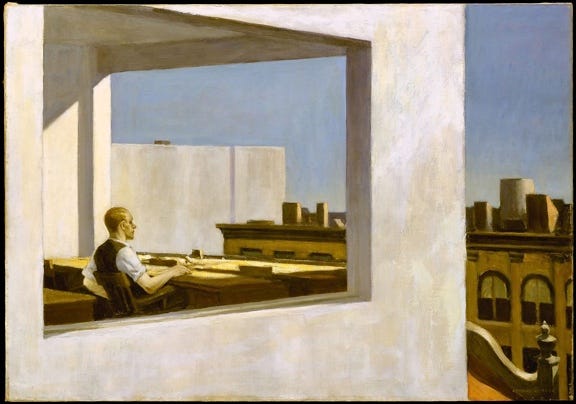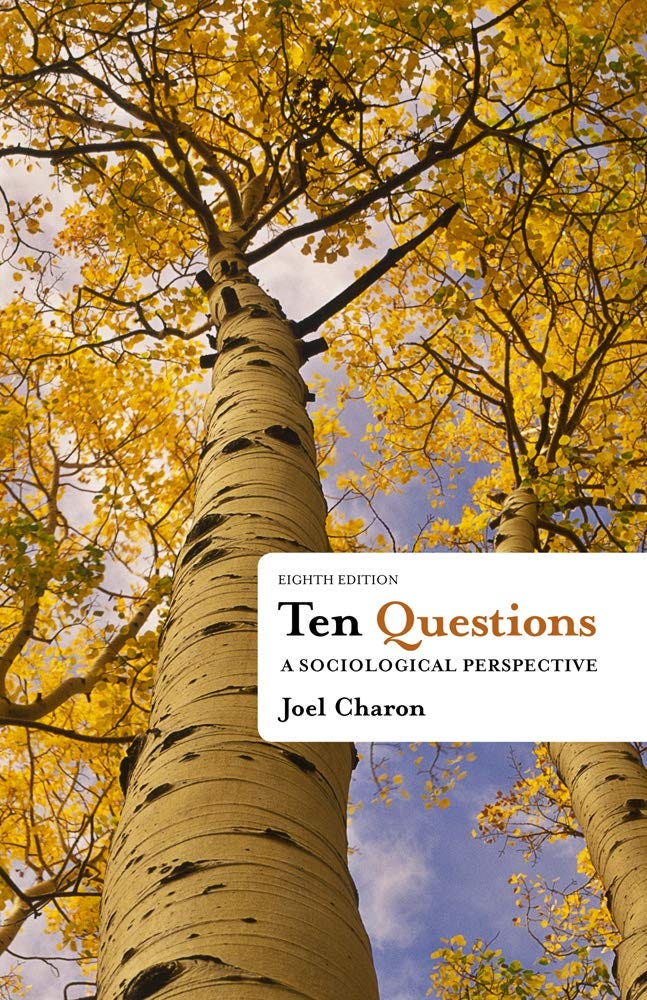#1 Weekly Reflection
What I’ve found and What I’ve Thought
Greetings from Tehran, Iran
Weekly reflection summarizes my week from musings, researches, and conversations I had during the week.
A piece of art
I try to introduce a piece of art with weekly reflections. I believe art is a facilitator of change. It evokes our inner narratives and gives us insight.
This week painting is from Edward Hopper (July 22, 1882 – May 15, 1967) my favorite artist.
From Hopper:
Great art is the outward expression of an inner life in the artist, and this inner life will result in his personal vision of the world. No amount of skillful invention can replace the essential element of imagination. One of the weaknesses of much abstract painting is the attempt to substitute the inventions of the human intellect for a private imaginative conception.
The inner life of a human being is a vast and varied realm and does not concern itself alone with stimulating arrangements of color, form and design.
The term life used in art is something not to be held in contempt, for it implies all of existence and the province of art is to react to it and not to shun it.
Painting will have to deal more fully and less obliquely with life and nature's phenomena before it can again become great.
From Hope to Social Collapse
I started last week by delivering a workshop on the concept of hope. You can read it here:
As this is my first weekly reflection, you may missed another article I’ve published two weeks ago:
Iran’s parliament is following the ratification of a law that will significantly impact free access to the Internet. It started arguments over social networks. The censorship, individual privacy, and data leak seem a global challenge. Governments, officially and unofficially invest to gain control of data. The Pegasus Spyware is just one sample.
As I follow trends, I was curious about the future of my country and I came to this TED Talk from Jared Diamond:
Diamond mention that there are 5 reasons why societies collapse:
1- Human Impact on the environment: People destroy the resources they depend on.
2- Climate Change: Climate can get warmer, colder, dryer, …
3- Neighboring friendly societies: support from friends.
4- Relation with hostile societies.
5- Political, social, economical, cultural attitudes.
In response to why societies do not change, he mentions that:
1- There’s a conflict of interest between the short-term interest of decision makers elite and the long-term interest of society as a whole.
2- Things that get societies in the trouble are also the source of their strengths. For example, religion is the source of power for some societies (leading by ideologies) and it becomes their weakness in terms of adapting to new situations.
Working on The Practitioner Model
I’m working on designing a model to enable people as change-makers. When I pay attention to patterns and challenges globally, I feel that we need to develop more change-makers. We need to go back to our humanistic nature to make positive change. I’ll write more on this.
Human Milk Sharing
In my searches on the concept of hope, I find this interesting article: How Mothers Make Meaning and Value Through Milk Sharing
from the article:
The practice of sharing breastmilk offers a vision for what human societies could become. In milk sharing, people look past some of their differences, and they work together to provide the best possible nutrition to human babies. Those who have extra engage in regular, ongoing labor to produce milk that they give away, and those who cannot produce accept these gifts, occasionally giving non-monetary expressions of gratitude. They work together to develop healthy babies, and in so doing, they establish local and global communities that are connected on a deep, ontological level.
On Sociology
I’m reading “ 10 Questions: A Sociological Perspective” book from Joel Charon. It’s a good starter to understand sociology and expand the view from different angles.
About the book:
This introductory text presents a unique approach to the examination of sociological principles. It draws you into the material--and encourages a deeper understanding of the discipline--by focusing on such overarching questions as "How do sociologists study society?" "How is society possible?" "Why is there misery in the world?" and "Are human beings free?" You'll learn about the philosophies of classical sociologists such as Marx, Weber, Durkheim, Mead, and Berger, and look at how the field of sociology has approached these questions over the past 150 years. You'll also consider the benefits and drawbacks of globalization, read about how individuals can affect society, and learn how the Tea Party political movement and the revolution in Egypt illustrate social conflict. As you explore sociology's compelling questions, you'll find that there are often no clear and ready answers.
Pierre Bourdieu in this short video describe sociology as martial art:
Tara and Self Identification
Tara (my daughter) is 1.5 years old now. Recently she points to her books and toys and then point to herself. It means the book and toys are hers. For most of my life I’ve thought about people development. I’ve coached people, delivered workshops, published articles. But I have to confess that when I see Tara in the course of life, I feel it’s first time that I understand how humans evolve and develop in action. It’s very interesting that I can rediscover things around, from her eyes. It’s like seeing the everyday life again.
Have great week ahead. I always do appreciate your comments. Please feel free to share with friends.




